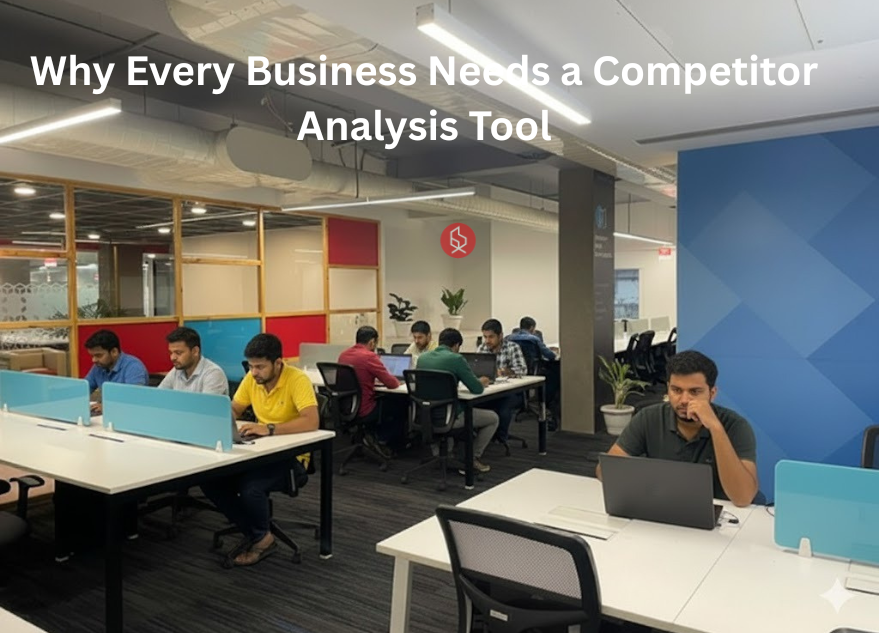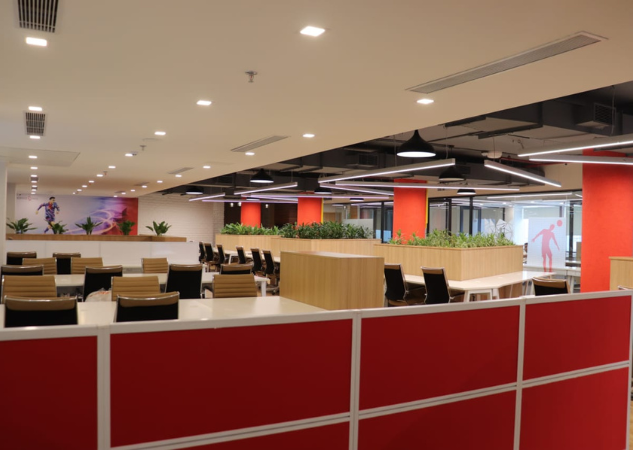In today’s competitive market, understanding your rivals is as crucial as knowing your customers. A competitor analysis tool helps businesses identify market gaps, refine strategies, and stay one step ahead in the competition.
💡 Are you looking for Coworking space in Gurgaon, Noida or Delhi? We are just a call away. Call Now: 08999 828282
10 Role of Competitor Analysis Tools in Shaping Business Strategy
- Understanding What a Competitor Analysis Tool Is
- Why Competitor Analysis Is Important for Businesses
- Identifying Market Gaps and Opportunities
- Tracking Competitor Marketing Strategies
- Improving SEO and Keyword Targeting
- Enhancing Product Development and Pricing
- Strengthening Customer Retention Strategies
- Measuring and Benchmarking Business Performance
- Saving Time with Automated Insights
- Staying Ahead of Emerging Trends
1. Understanding What a Competitor Analysis Tool Is
A competitor analysis tool is a software or platform that collects and analyzes data about your competitors. It helps you understand their strategies, keywords, pricing, and marketing performance. These tools provide actionable insights to guide your business decisions. Whether you’re launching a new product or planning a campaign, using competitive analysis software ensures you base your choices on facts, not assumptions. It’s like having a behind-the-scenes look at what’s driving your competitors’ success.

2. Why Competitor Analysis Is Important for Businesses
Knowing why competitor analysis is important can completely change your growth strategy. It helps businesses identify their strengths, weaknesses, opportunities, and threats (SWOT). By tracking market movements and competitor activities, you can anticipate trends and make informed decisions. Without business competitor analysis, you might miss key opportunities or fall behind in innovation. Regular competitor research ensures your strategies remain relevant and competitive in a rapidly changing market.
3. Identifying Market Gaps and Opportunities
A market competition analysis helps you find what your competitors are missing gaps that you can fill to attract customers. By studying their products, pricing, and promotions, you can uncover underserved audiences or emerging needs. For example, if competitors overlook customer support, improving yours can become a selling point. With the help of competitor research tools, you can quickly identify profitable niches and craft unique value propositions to stand out.
Also Read: 10 Things Every Growing Business Needs to Monitor to Scale Successfully
4. Tracking Competitor Marketing Strategies
With competitor analysis tools, you can easily monitor how rivals promote their products across various channels. You’ll learn which platforms they use, what content performs best, and which keywords they target. This helps you fine-tune your SEO, ads, and content marketing. By comparing engagement and messaging, you can design campaigns that outperform competitors. These insights transform guesswork into data-driven marketing strategies that attract more qualified leads.
5. Improving SEO and Keyword Targeting
A strong SEO strategy starts with understanding what’s already working in your niche. Competitor research tools reveal which keywords drive traffic to other websites and where your site can improve. You can discover backlink opportunities, content ideas, and high-ranking keywords your competitors might be ignoring. This type of business competitor analysis allows you to optimize your website for better visibility and outrank your competition in search results.
6. Enhancing Product Development and Pricing
Studying competitors isn’t just for marketing it’s essential for product development too. A competitive analysis software helps you compare product features, performance, and pricing. You can identify what customers value most and adjust your offerings accordingly. For instance, if your competitors’ products lack certain features, you can introduce them to attract more buyers. Tracking their pricing strategies also helps you stay competitive without sacrificing profits.
7. Strengthening Customer Retention Strategies
A thorough market competition analysis helps you understand what keeps customers loyal to other brands. By analyzing competitor reviews, testimonials, and social media engagement, you can spot areas where they succeed or fail. This insight allows you to enhance your own customer service, loyalty programs, or user experience. When you use a competitor analysis tool, you can predict customer behavior and make smarter retention decisions to build long-term relationships.
8. Measuring and Benchmarking Business Performance
It’s hard to know how well you’re doing without comparing yourself to others. Business competitor analysis tools provide key benchmarks — such as website traffic, conversion rates, and engagement levels to measure your performance accurately. This helps you set realistic goals and monitor progress over time. By regularly evaluating your position in the market, you can identify growth areas and make strategic improvements to stay competitive.
💡 Are you looking for Coworking space in Gurgaon, Noida or Delhi? We are just a call away. Call Now: 08999 828282
9. Saving Time with Automated Insights
Manual research takes hours and often results in incomplete data. Competitor analysis tools automate the entire process, gathering and organizing information from multiple sources in minutes. You’ll get instant access to trends, performance metrics, and keyword updates. These tools make market competition analysis faster and more efficient, allowing you to focus on applying insights rather than collecting data. Automation ensures your team works smarter, not harder.
10. Staying Ahead of Emerging Trends
Markets evolve quickly, and staying updated is essential. A competitor research tool helps you detect shifts in consumer behavior, new technologies, or upcoming product launches. By tracking industry patterns and competitor innovations, you can adapt your strategy early. Using competitive analysis software ensures you’re not just reacting to changes but leading them. Staying proactive helps position your business as a forward-thinking leader in your industry.
Every successful business thrives on knowledge and a competitor analysis tool provides exactly that. It enables you to make informed decisions, improve your offerings, and uncover growth opportunities. Whether you’re a startup or an established brand, using competitor research tools can transform how you operate and compete. In a world driven by data, smart businesses use analysis to stay ahead, not behind.
The Office Pass (TOP) offers vibrant coworking spaces designed to help you focus, collaborate, and grow your business with ease. Call (TOP) at 8999 828282 to find your ideal workspace today!
FREQUENTLY ASKED QUESTIONS (FAQS):
Question: What is a competitor analysis tool?
Answer: A competitor analysis tool is software that helps businesses track and evaluate their competitors’ strategies. It gathers data on keywords, marketing performance, content, and audience engagement. This helps you make better business decisions based on real insights instead of assumptions.
Question: Why is competitor analysis important for small businesses?
Answer: For small businesses, competitor analysis provides clarity on where they stand in the market. It helps identify strengths and weaknesses, uncover untapped opportunities, and create targeted marketing plans. Knowing what works for competitors can save time, reduce mistakes, and boost your competitive edge.
Question: How do competitor research tools help with SEO?
Answer: Competitor research tools reveal which keywords and backlinks your competitors use to rank higher in search engines. You can use this data to improve your SEO strategy, identify content gaps, and optimize your site for better visibility and traffic.
Question: Can a competitor analysis tool improve my marketing strategy?
Answer: Yes. By tracking your competitors’ ads, content, and social campaigns, a competitor analysis tool helps you understand what resonates with your audience. You can then create more effective, data-backed marketing campaigns that deliver better results.
Question: What’s the difference between competitor analysis and market analysis?
Answer: Competitor analysis focuses on studying rival companies, while market analysis examines the overall industry, trends, and consumer behavior. Both are essential, but competitor analysis gives more direct insights into how to outperform specific rivals.
Question: Which are some popular competitor analysis tools?
Answer: Some widely used competitor research tools include SEMrush, Ahrefs, SpyFu, SimilarWeb, and BuzzSumo. These platforms help analyze SEO data, traffic sources, and content performance to strengthen your business strategy.
Question: How often should I do a competitor analysis?
Answer: Ideally, businesses should perform a market competition analysis at least once every quarter. Regular updates ensure you stay informed about new trends, emerging competitors, and strategy changes in your industry.
Question: Can competitor analysis tools help with pricing decisions?
Answer: Absolutely. Competitive analysis software can track competitors’ pricing structures and product features. This allows you to adjust your pricing to stay competitive while maintaining profitability.
Question: Do I need technical skills to use these tools?
Answer: Most modern competitor research tools are user-friendly and designed for beginners. They offer visual dashboards, simple filters, and automated reports that make data interpretation easy even for non-technical users.
Question: How does competitor analysis support business growth?
Answer: By using a business competitor analysis, you gain clear insights into what’s working in your industry. It helps you refine strategies, discover market gaps, and anticipate changes all of which drive smarter, faster, and more sustainable growth.









